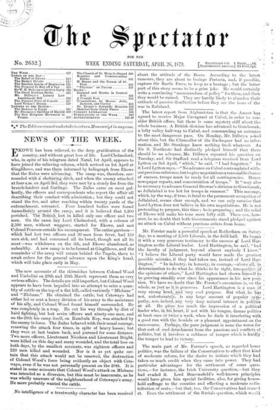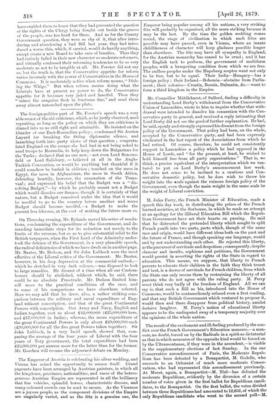The main part of Mr. Forster's speech, as regarded home
politics, was the failure of the Conservatives to effect that kind of moderate reform, for the desire to initiate which they had taken so much credit when they came into power. They had particular advantages for the settlement of some ques- tions,— for instance, the Irish University question,—but they had evaded it. Lord Beaconsfield's well-known principles would have given him special facilities, also, for giving house- hold suffrage to the counties and effecting a moderate redis- tribution of seats,—but that, too, the Conservatives had crane-I at. Even the settlement of the Burials question, which would. have enabled them to boast that they had prevented the question of the rights of the Clergy being fought out beside the graves of the people, was too hard for them. And as for the County Government question, they were so shy of it, that after intro- ducing and abandoning a bad Bill last year, they had intro- duced a worse this, which, if carried, would do hardly anything, except create a new Board to take care of lunatics. Thus they had entirely failed in their new character as moderate reformers, and virtually confessed their reforming tendencies to be so very moderate as not to be tangible at all. Mr. Forster did not say so, but the truth is, that the Conservative appetite for reform varies inversely with the power of Conservatives in the House of Commons. It is moderately active when reform means, " Dish- ing the Whigs." But when reform means doing what the Liberals have at present no power to do, the Conservative appetite for it becomes very jaded and fanciful. Then they " mince the sanguine flesh in frustums fine," and send them away almost untouched upon the plate.



































